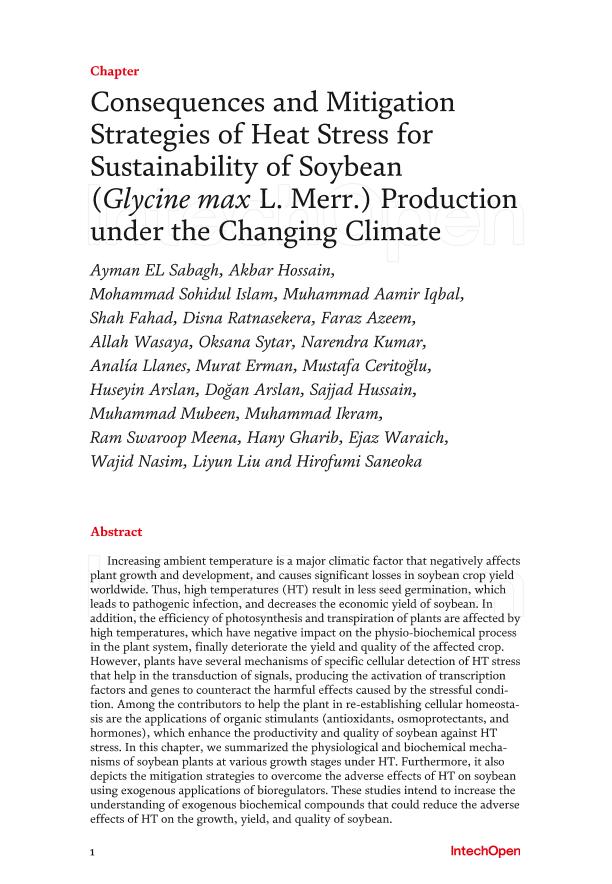Capítulo de Libro
Consequences and Mitigation Strategies of Heat Stress for Sustainability of Soybean (Glycine max L. Merr.) Production under the Changing Climate
Título del libro: Plant Stress Physiology
Sabagh, Ayman EL; Hossain, Akbar; Islam, Mohammad Sirajul; Iqbal, Muhammad Aamir; Fahad, Shah; Ratnasekera, Disna; Azeem, Faraz; Wasaya, Allah; Sytar, Oksana; Kumar, Narendra; Llanes, Analia Susana ; Erman, Murat; Ceritoğlu, Mustafa; Arslan, Huseyin; Arslan, Doğan; Hussain, Sajjad; Mubeen, Muhammad; Ikram, Muhammad; Meena, Ram Swaroop; Gharib, Hany; Waraich, Ejaz; Nasim, Wajid; Liu, Liyun; Saneoka, Hirofumi
; Erman, Murat; Ceritoğlu, Mustafa; Arslan, Huseyin; Arslan, Doğan; Hussain, Sajjad; Mubeen, Muhammad; Ikram, Muhammad; Meena, Ram Swaroop; Gharib, Hany; Waraich, Ejaz; Nasim, Wajid; Liu, Liyun; Saneoka, Hirofumi
 ; Erman, Murat; Ceritoğlu, Mustafa; Arslan, Huseyin; Arslan, Doğan; Hussain, Sajjad; Mubeen, Muhammad; Ikram, Muhammad; Meena, Ram Swaroop; Gharib, Hany; Waraich, Ejaz; Nasim, Wajid; Liu, Liyun; Saneoka, Hirofumi
; Erman, Murat; Ceritoğlu, Mustafa; Arslan, Huseyin; Arslan, Doğan; Hussain, Sajjad; Mubeen, Muhammad; Ikram, Muhammad; Meena, Ram Swaroop; Gharib, Hany; Waraich, Ejaz; Nasim, Wajid; Liu, Liyun; Saneoka, Hirofumi
Otros responsables:
Hossain, Akbar
Fecha de publicación:
2021
Editorial:
IntechOpen
ISBN:
978-1-83962-527-5
Idioma:
Inglés
Clasificación temática:
Resumen
Increasing ambient temperature is a major climatic factor that negatively affects plant growth and development, and causes significant losses in soybean crop yield worldwide. Thus, high temperatures (HT) result in less seed germination, which leads to pathogenic infection, and decreases the economic yield of soybean. In addition, the efficiency of photosynthesis and transpiration of plants are affected by high temperatures, which have negative impact on the physio-biochemical process in the plant system, finally deteriorate the yield and quality of the affected crop. However, plants have several mechanisms of specific cellular detection of HT stress that help in the transduction of signals, producing the activation of transcription factors and genes to counteract the harmful effects caused by the stressful condition. Among the contributors to help the plant in re-establishing cellular homeostasis are the applications of organic stimulants (antioxidants, osmoprotectants, and hormones), which enhance the productivity and quality of soybean against HT stress. In this chapter, we summarized the physiological and biochemical mechanisms of soybean plants at various growth stages under HT. Furthermore, it also depicts the mitigation strategies to overcome the adverse effects of HT on soybean using exogenous applications of bioregulators. These studies intend to increase the understanding of exogenous biochemical compounds that could reduce the adverse effects of HT on the growth, yield, and quality of soybean.
Archivos asociados
Licencia
Identificadores
Colecciones
Capítulos de libros (INIAB)
Capítulos de libros de INSTITUTO DE INVESTIGACIONES AGROBIOTECNOLOGICAS
Capítulos de libros de INSTITUTO DE INVESTIGACIONES AGROBIOTECNOLOGICAS
Citación
Sabagh, Ayman EL; Hossain, Akbar; Islam, Mohammad Sirajul; Iqbal, Muhammad Aamir; Fahad, Shah; et al.; Consequences and Mitigation Strategies of Heat Stress for Sustainability of Soybean (Glycine max L. Merr.) Production under the Changing Climate; IntechOpen; 2021; 336-358
Compartir
Altmétricas



